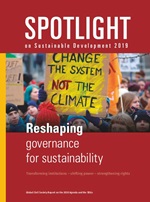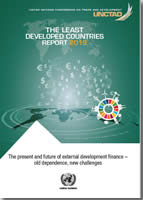Social Watch news
Published on Sun, 2019-12-15 19:01
 |
Approving good plans and failing to implement them is also true in Canada. With the release of Opportunity for All in August 2018, followed by the introduction of the Poverty Reduction Act in November 2018, the federal government has for the first time set targets for reducing poverty in Canada, defined an official poverty line, and established a framework and a process for reporting publicly on progress – in keeping with its commitment to “end poverty in all of its forms everywhere” set out in the 2030 Agenda. The report by the Canadian Centre for Policy Alternatives praises this “significant policy win”, which provides “an architecture and different mechanisms for holding governments to account for creating a society where everyone’s basic needs are assured and their active participation in community life supported”. But, at the same time, it adds, the report “does not include any new investments in the programmes needed to achieve the strategy’s stated goals”. The targets to reduce poverty by 20 percent by 2020 and by 50 percent by 2030 “lack ambition and sense of urgency”. The report values the new plan “more as a framework than a strategy to accelerate poverty reduction.
|
Published on Sun, 2019-12-15 18:53
Global powers and Pacific Island nations are racing to divide up the ocean's resources using the narratives of Blue Economy and Blue Growth to justify their exploitation, argues Maureen Penjueli, of the Pacific Network on Globalization. Technology advances make once-unfeasible seafloor depths increasingly viable and will allow corporations to plunder oceanic resources in a bid to secure food security and alternative sources of minerals and energy for rapid growing populations.
The Blue Economy concept grew out of the broader green growth concept and a growing concern about the heavy damage wrought on our ocean ecosystems by overfishing, habitat destruction, marine pollution, ocean acidification and climate change.
|
Published on Mon, 2019-12-09 12:28
After 10 bi-annual sessions and a one-month open consultation, the Interagency and Expert Group on Sustainable Development Goals (IAEG-SDGs) has made important progress in finalizing its global indicator framework by which to measure progress towards the 17 SDGs and 169 targets at the global level. It has agreed on some additional indicators, including a few long sought by civil society organizations, and has upgraded or replaced indicators stalled at Tier III, a continual demand by Member States.
But five years into the implementation of the SDGs, this process has raised new concerns. How has it helped advance progress on achieving the SDGs, particularly at the national level? Has it been overtaken by other assessments, including by UN bodies and the Global Sustainable Development Report, which seek to examine the obstacles to progress not included in the global indicator framework, such as external and global constraints as well as trade-offs as progress towards one goal may mean regression on another?
|
Published on Sun, 2019-12-08 00:00
Are Finland and Norway a model to follow if you want to achieve sustainable development or an example of bad practices to avoid? It all depends who you ask.
The two Nordic countries are listed among the top ten in the Global SDG Index1 published last September by the Bertelsmann Stiftung and the Sustainable Development Solutions Network (BS-SDGI). But they rank among the bottom 10 worst performers in the Sustainable Development Index (JH-SDI) published by anthropologist Jason Hickel in the January 2020 edition of the Ecological Economics Journal.2
|
Published on Sun, 2019-12-01 06:45
“The wealthy countries must begin providing public climate finance at the scale necessary to support not only adaptation but loss and damage as well, and they must do so in accordance with their responsibility and capacity to act.” This is the main message of a technical report titled Can Climate Change-Fuelled Loss and Damage Ever Be Fair?, launched on the eve of the UN Climate Change Conference (COP25) to be held in Madrid from 2 to 13 December.
|
Published on Thu, 2019-11-21 14:00
Wicked Politics and Shaken Socio-Economy
Since 17 October 2019, Lebanon has been witnessing a massive wave of unprecedented nationwide protests, which are deemed tomarka new era in its history. These protests are motivated by the direct repercussions of the economic and monetary crisis on the Lebanese population, but are indeed rooted in a structurally flawed economic system and wicked political practices and corruption embraced by the successive governments for decades. The protests ar widespread across the country and remain non-sectarian, marking the biggest postwar civil movement, as the Lebanese people overcome their religious and political divergences and join forces in an attempt to achieve real change. This change was long awaited by the Lebanese, and the civil society specifically that has been for years trying to promote partnerships and engage in policy making at different levels, despite the lack of serious and effective channels.
|
Published on Tue, 2019-11-19 23:00
The Least Developed Countries (LDCs) need to use external finance to structurally transform their economies, in order to manage their aid dependency and eventually escape from it, according to the UN Conference on Trade and Development (UNCTAD).
In its latest Least Developed Countries Report 2019, UNCTAD said that the LDCs account for 15 of the 20 most aid-dependent countries in the world due to persistent shortfalls in their domestic savings, among other factors.
It said that the LDCs should take ownership of their development agenda and manage the allocation of external development finance in alignment with their national development priorities.
|
Published on Mon, 2019-11-18 14:08
Scientific evidence and data are not at all missing in the United Kingdom, where inequality continues to rise. “Human rights researchers and practitioners working in and on the UK generally have access to a large amount of relevant and detailed data, at least when compared with other countries” recognizes Just Fair, a group of economic and social rights campaigners. That is why they find it “all the more surprising” that the UK’s Voluntary National Review (VNR) 2019, fails to disaggregate the information. “To ensure that nobody is left behind and to provide a truly meaningful picture, the government must gather and present the evidence based on all the prohibited grounds of discrimination according to both international and domestic human rights law, and this includes income and wealth disparities.”
Just Fair reports that “the UK is a highly unequal society. For example, life expectancy for women born in deprived areas has declined in recent years, something utterly unacceptable in the fifth largest world economy”.
|
Published on Mon, 2019-11-18 14:00
 |
In Brazil the government of Captain Jair Bolsonaro does not make a secret of its disdain for policies and institutions aimed at supporting the people living in poverty. In its first day in office, on 1 January 2019, president Bolsonaro, dissolved the institutions responsible for the Zero Hunger policies (see Special Contribution 0.2 on the temporary extinction of CONSEA), an initiative that inspired anti-poverty policies around the world. The report by INESC documents the reduction, in the following weeks of policy spaces with civil society participation from 500 to 70. The affected monitoring bodies include the Council for Drug Policies, Council on the Rights of Persons with Disabilities, Council for the Eradication of Forced Labour, Commission for Biodiversity, and many more. Land-right defenders, trade unionist and NGO activists are being threatened and the Pastoral Commission on Land, a body of the Catholic Church, reported a dramatic increase in the first months of 2019 of murders related to land conflicts.
|
Published on Sat, 2019-11-16 08:57
More than 40 Civil Society Organizations endorsed the letter supporting the draft UN debt resolution currently being negotiated in the UN General Assembly’s Economic and Financial Committee (Second Committee).
|
SUSCRIBE TO OUR NEWSLETTER
Submit

|









